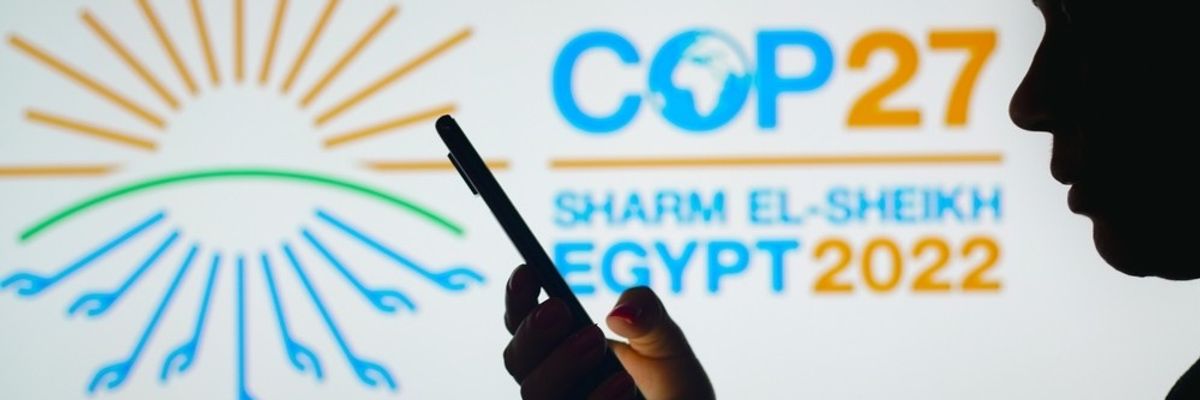International climate talks (COP27) ended in Egypt this weekend with an agreement on the contentious issue of compensating vulnerable states for the destruction caused by climate change (known as loss & damage in climate parlance).
It remains to be seen if the accord will be more than symbolic. Meanwhile, the relentless march of warming, worsened by the turn to greater fossil fuels due to the pressures of the Ukraine war, continues. Even so, recent developments in the climate arena provide geopolitical opportunities for the United States to refashion its strategy toward the Global South and its key rival, China.
The United States was strongly opposed to setting up a separate fund for loss & damage. A few weeks before COP27 U.S. climate envoy John Kerry lost his cool in a disjointed response to a pointed question on the topic from a journalist. But at the last minute the United States changed its mind, handing poorer states a victory.
But the devil is in the details. Thus far, commitments on loss & damage funding have come almost entirely from Europe — and that’s a tiny fraction of the funds needed. And with U.S. politicians – including some Democrats – reluctant to make more than token payments to international efforts on climate change, the fund is in danger of remaining more symbolic than substantive.
Meanwhile, as my colleague Anatol Lieven has laid out, climate risks and threats are multiplying, even as Pentagon budgets to counter Russia and China continue to balloon. Thus, despite all the grandstanding in Sharm El-Sheikh on committing to a (now practically unachievable) 1.5-degree Celsius warming goal, we are looking at a world of much greater natural disasters and slow-onset degradation of human and agricultural productivity juxtaposed with growing great power tensions. Yet there is perhaps still a fighting chance to keep global warming to within 2 degrees Celsius. It is a goal well worth striving for, as every fraction of a degree arrested could mean many lives saved.
While substantive wins on climate action are hard to find these days, the climate crisis could have payoffs on an unexpected front — geopolitics. The resumption of U.S.-China dialogue on climate change (after Beijing unhelpfully suspended it in the wake of Nancy Pelosi’s ill-advised visit to Taiwan this past August) continues a thaw that began with the Xi-Biden meeting on the sidelines of the G20 summit in Indonesia. Such cooperation could yield significant breakthroughs on, among other things, curbing emissions of the potent warmer methane, and scaling up of renewable energy technologies more rapidly. But the climate dialogue could also add momentum toward an overall stabilization of the world’s most important bilateral relationship.
We are still far from such a stabilization, but the arena of climate change has a role to play if we are ever to get there.
The U.S.-China engagement on climate change has another potential benefit — a better U.S. strategy toward the Global South. This strategy is broken, and badly in need of repair. Washington has gone overboard in seeing the Global South as an arena of the “strategic competition” in ways that are damaging U.S. interests. In the polarized debate on the Ukraine war, a large swath of the Global South has taken an independent position.
Over the past two decades, China has greatly deepened its presence in the Global South, through much greater trade and ramped up investment under the rubric of its Belt and Road Initiative (BRI). Though some of these investments have not gone well, many Global South states have welcomed a greater Chinese role in their economies. This opens up the possibility of Beijing as a conduit for bridging North-South differences.
This is already being seen to an extent on debt relief for poorer states hit badly by the twin shocks of Covid and the Ukraine war. Wealthy states of the Paris Club and China are working together through the G20’s Debt Service Suspension Initiative. On climate change, China stood steadfastly with the Global South on loss & damage but also indicated it might contribute to the newly set-up fund, as long as it is understood to be on a voluntary basis. This is a potential pathway for Washington and Brussels to justify raising their contributions, and could thus trigger a mutually reinforcing cycle of more financing from all major emitters for more vulnerable states. If Washington and Beijing wish to seek even a degree of relaxation of their trade war, reducing barriers and reversing tariffs on clean energy products may be less controversial than other conciliatory actions.
In a world of deepening divides and existential crises, opportunities for repairing the international system appear to be few and far between. Washington and Beijing should not shirk from utilizing climate change as one such opportunity.















